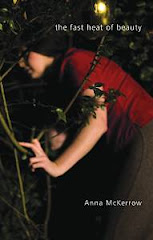I am priveliged to have in the CD player in my car (the only place I get any peace to listen to anything) the orginal audio recording of Anais Nin reading her symbolist prose poem The House of Incest. I came to get it from my dad who has just finished his BA dissertation on Louis and Bebe Barron, the sound artists who created the soundtrack to Forbidden Planet. This recording is one of a number of recordings of artists reading their own work that the Barrons recorded in 1949.
The House of Incest is a surrealistic look within the narrator's subconscious mind as she attempts to escape from a dream in which she is trapped, or in Nin's words, as she attempts to escape from "the woman's season in hell." So says Wikipedia.
Nin's usage of the word incest in this case is metaphorical, not literal. In other words, in this book the word "incest" describes a selfish love where one can appreciate in another only that which is similar to oneself. One is then only loving oneself, shunning all differences. At first, such a self-love can seem ideal because it is without fear and without risk. But eventually it becomes a sterile nightmare. Toward the end of the book, the character called "the modern Christ" puts Nin’s use of the word into context: “If only we could all escape from this house of incest, where we only love ourselves in the other."
Nin was under the analysis of Otto Rank during the period of writing House of Incest. Rank was an early disciple of Freud, serving as the secretary and youngest member of his Vienna group, but had long since dissented from Freudian orthodoxy and developed his own theoretical school. Incest: From a Journal of Love"—The Unexpurgated Diary of Anaïs Nin (1932–1934) reveals that the two were also having an affair.
Rank helped Anaïs edit House of Incest. He had experience with this topic, as Otto Rank's most famous book is The Trauma of Birth. House of Incest is largely an attempt by the narrator to cope with the shock of the trauma of birth. Anaïs Nin describes the process as akin to being "[e]jected from a paradise of soundlessness.... thrown up on a rock, the skeleton of a ship choked in its own sails."
In Anaïs Nin: An Introduction, authors Duane Schneider and Benjamin Franklin V both argue that the basic theme of House of Incest is that ultimately life in the real world, which contains both pleasure and pain, is preferable to any self-created world that attempts to include only pleasure [1]. Franklin and Schneider argue that a world consisting only of pleasure is ultimately a sterile world where intellectual, emotional, and spiritual growth is not possible, and what results is stunted people. In this, they offer the passage from House of Incest wherein Anaïs Nin writes, "Worlds self made are so full of monsters and demons."
The prose of House of Incest is considered by many to be one of the major challenges of the work. The prose and tone of the work is not linear and does not utilize everyday language. Rather, the book is written in prose that is often described as either surrealist or symbolist.
"My first vision of earth was water veiled. I am of the race of men and women who see all things through this curtain of sea and my eyes are the color of water. I looked with chameleon eyes upon the changing face of the world, looked with anonymous vision upon my uncompleted self." (Page 15)
It's a really beautiful piece, and Nin's voice, off-key intonation and accent gives it an otherwordliness and exoticism.
Subscribe to:
Post Comments (Atom)







No comments:
Post a Comment